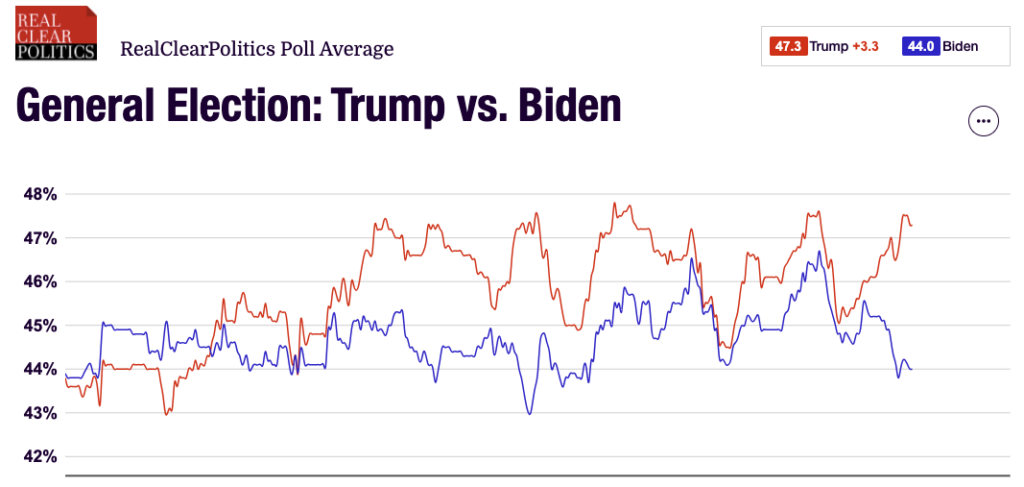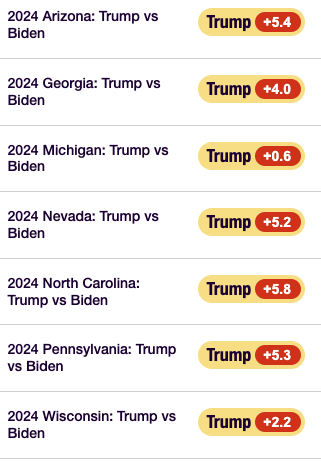Polls Continue Trumpward Shift
The slide continues.

The Cook Political Report’s Amy Walter provides yet more bad news for President Biden in the wake of the debate: “Six States Move Toward Trump in Electoral College Ratings.” Alas the data and analysis are paywalled (at $29/month, no less), so I’m left with secondary sources.
The Hill (“Democrats lose ground in 6 states with election forecaster’s post-debate shift“):
Former President Trump is gaining ground in key swing states and could threaten to take states once considered to be safe for Democrats, as President Biden struggles to regain ground after a shaky debate performance, according to a new Cook Political Report analysis Tuesday.
Biden’s defiance against calls for him to leave the presidential campaign after last month’s debate have only worsened his chances in November, Cook Editor-in-Chief Amy Walter wrote. “Biden was losing pre-debate. Now, he’s losing by a bit more,” she said, adding that the possibility Biden leaves the race at this point is “remote.”
Citing postdebate polling, Cook announced it will move Minnesota, New Hampshire and Nebraska’s 2nd Congressional District from “Likely Democratic” to “Lean Democratic.” The group also moved Nevada, Arizona and Georgia from “Tossup” to “Lean Republican.”
[…]
While polling has been limited since the debate, signs point to the debate shifting about 2 percentage points of support from Biden to Trump, Walter said. “However, given our closely divided electorate, even a small two-point shift is significant,” she wrote.
Three states remain in the “Tossup” column in Cook’s forecast: Michigan, Pennsylvania and Wisconsin.
Walter noted that Trump has polled strongly in Pennsylvania, taking a small lead over Biden, though she said that it’s too early to say whether either candidate is truly favored.
She argued Biden’s debate performance proved the dire stakes of the president’s key campaign problem: a lack of enthusiasm among voters.
“The Biden team has argued that though these voters may be disengaged now, once they are made aware of the high-stakes of this election, they will ultimately turnout for the president,” Walter wrote. “However, Biden’s weak debate performance calls into question whether he can effectively deliver that message to these already disenfranchised and skeptical voters.”
“Biden’s challenge isn’t simply to convince voters that he can win, or that his policies are superior to Trump’s,” she continued. “He has to convince voters, including many in the anti-Trump coalition who supported him four years ago, that he is physically and mentally able to govern for another four years.”
Walter also cited other factors that could help Trump’s campaign in the coming months, including a favorable media environment and a shifting focus away from his legal trouble. With media focused on criticism of Biden’s age and with Trump’s legal trials delayed to beyond the election, fewer critical eyes are on the former president, she argued.
G. Elliott Morris of the Nate Silver-less 538, offers some solace in “Why 538’s forecast hasn’t moved much post-debate.”
According to 538’s average, former President Donald Trump’s margin in national polls has grown by just about 2 percentage points since June 27, when President Joe Biden delivered a poor performance in the cycle’s first presidential debate. Biden’s current 2.1-point deficit is the worst position for a Democratic presidential candidate since early 2000, when then-Vice President Al Gore was badly lagging Texas Gov. George W. Bush, according to our retroactive polling average of that race.
Yet our forecast for the 2024 election has moved very little. On debate day, we gave Biden a 50-out-of-100 chance of winning the majority of Electoral College votes. That chance briefly dipped as low as 46-in-100 on July 5, but it now stands at 48-in-100. At first glance, this lack of movement is confounding: If Biden has limped from roughly tied to down more than 2 points in national polls, shouldn’t his chances of winning have sunk by more than a few points?
This is followed by several paragraphs explaining why political forecasting is hard. The payoff is, well, not helpful:
The model’s cumulative prediction is more heavily weighted toward whichever prediction we are more certain of: either the history-based fundamentals one or the prediction of what the polls will be on Election Day and whether they’ll be accurate. Right now, we’re not too sure about what the polls will show in November, and that decreases the weight our final forecast puts on polls today.
The reason, in other words, that our forecast hasn’t moved much since the debate is that a 2-point swing in the race now does not necessarily translate to a 2-point swing on Election Day. The only way to take the polls more seriously is simply to wait.
So, this is indisputably true. Why, come Christmas, we’ll almost certainly know who won the election. Maybe we shouldn’t have political forecasting at all!
Running the model with tweaked assumptions, not surprisingly, changes the forecast.
The results of these different model settings show us that having less uncertainty about how the campaign could unfold increases Trump’s odds of winning. That’s because he’s leading in polls today — so making our prediction of the polls on Election Day more closely match their current state pulls Biden’s vote margin down, away from the fundamentals and closer to what would happen if the election were held today. And when we remove the fundamentals from the model completely, we get an even higher probability of a Trump victory.
And this is the root of why 538’s forecast has been more stable than others: Most other forecasts simply take current polls more seriously. That is not necessarily the wrong prediction about the future; we just found that less error did not backtest well historically. Many different statistical models can be somewhat useful at explaining uncertainty in the election, and with few historical cases, it’s impossible to say that one of us is right or the other is wrong.
This is both true and decidedly unhelpful. The correct answer to predicting volatile human behavior four months out is always some variation of “Who the fuck knows?”
This is one of the many ways in which politics is like sports. The games are going to be played at some point, so there’s no point in wasting time talking about who’s going to win. But sports fans and political junkies enjoy spending a lot of time pouring into the data and analyzing possible outcomes even though it will have essentially zero impact. It’s what separates the fanatics from those who just tune in to watch the last quarter of the championship game.
If you don’t much care whether a given team wins, then there’s no reason to expend much time and energy worrying about it. For the relative handful of obsessives, though, we live and die with every game or poll or major campaign event.
Here’s where the national-level polling stands:

This, too, is less than encouraging:

Assuming Biden doesn’t drop out—which is indeed my assumption—my instinct is that he’s going to lose the Electoral College and, quite possibly, the popular vote. I have very little confidence that he’s going to suddenly become even a replacement-level politician in public appearances on a regular basis. At the same time, there has not been a presidential nominee within an order of magnitude of Trump in sheer volatility. The chances that there will be another “Grab ’em by the pussy” moment between now and November are pretty high.
Nate Silver throughout this cycle has been consistently more bearish about Biden’s chances than his own former organization. Even before the debate, he gave Biden just a one-third chance of winning, at a time when 538 gave him a slight edge.
@Kylopod: Disney kept the 538 brand but Silver took his proprietary model with him and has tweaked it. Plus, I think ABC News is simply more reluctant to make bold pronouncements than Silver; institutions and individuals have different incentives.
If we rely on polls and pundits……really what is the point of elections?
Well, the fun starts next Monday with the RNC. And goes up to 11 with the VP pick announcement.
Then Democrats have to wallow in anyone else but Joe Biden drama for another month before the DNC puts it completely to bed.
@Bobert: That all the evidence shows Biden is wildly unpopular and running behind Trump in national and swing state polls would seem useful information for political junkies. But, as noted in the OP, others can just wake up the day after the election and see who won. But it’s increasingly looking like it’ll be Trump.
@JKB: Next week is when Trump shows us whether he can make a pick better than Mike Dense this time. My guess is no; what’s yours?
Some things are immutable. Trump always leaves money on the table in his haste to “win” over his opponent, and he always shows that he can’t even recognize “the best people” let alone hire them. I’m looking forward to seeing this year’s swindle. But I wouldn’t be if I were still a Republican.
@just nutha: Do you think Trump will pick a non-entity, or will he get swindled into picking someone ambitious who is just pretending to be loyal to get on the ticket and will then try to be the power behind the throne?
I’m guessing both in one person.
@Gustopher: My guess would be the “pretends to be loyal to strike at the king” and “unable to pull off the strike” combo. If anyone can pick that guy, it’s Trump.
ETA: To be fair, I sorta think Dense had the same type of plan. With Trump, it’s a tempting lure.